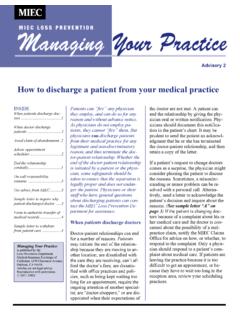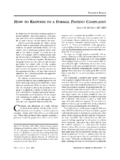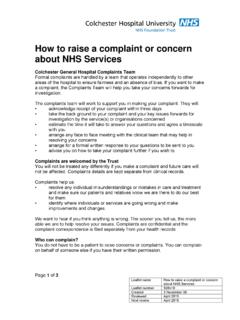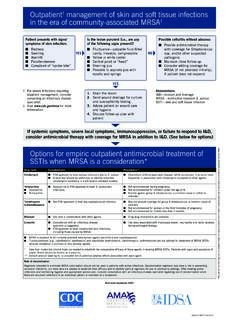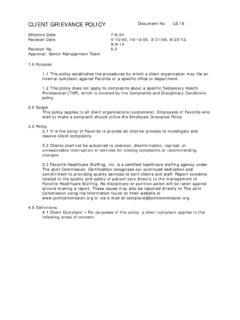Transcription of Patient complaints: how to stop them before they …
1 Advisory 3 Patient complaints : how to stop them before they start INSIDEHow to avoid Patient complaints ..1 When you can t please all the people all the Contact MIEC:Home Office Claims Oakland, CA 510/428-9411 (Bay Area) Outside 510: 800/227-4527 Hawaii Claims Office Honolulu, HI 808/545-7231 Idaho Claims Office Boise, ID 208/344-6378 Loss Prevention Department show that people complain or sue doctors when they do not get a timely or credible explanation of un-expected complications, or answers to questions about their own or a relative s treatment. The leading rea-sons for Patient complaints include: delayed receipt of test results; long waits for an appointment; being kept waiting too long to see the doctor; staff rudeness or a doctor s poor bedside manner; and billing er-rors. Anticipating problems and re-sponding promptly to complaints can prevent an unhappy Patient from hir-ing an attorney or threatening to sue.
2 How to avoid Patient complaints Treat patients with respect. Protect their privacy and the c onfidential-ity of their medical record. Answer the phone promptly and courte-ously. Give patients a time frame when the doctor can return their phone call. Communicate clearly; explain what you are doing and why. Edu-cating patients about actions or treatment a voids misunderstand-ing. Avoid surprises. Tell new patients if you charge fees for missed or late appointments; interest on late payments; and if you are required to collect insura nce co-payment s at the time of treatment . Explain other policies, such as limitations on refilling medica-tions after office hours. State these poli-cies in an attractive, inexpensive Patient information brochure that is given to new patients and also displayed in the reception area. Don t delay in reporting test results.
3 Pa-tients often are anxiously awaiting re-sults of significant tests, such as X-rays, mammography, Pap smears, PSAs, and biopsies. Note:only a physician should inform patients of significant or abnor-mal test results, and explain if follow-up is needed. The doctor can delegate to staff members responsibility for inform-ing patients about normal test results. Some physicians educate patients by mailing a summary of test results on a pre-printed form that: (a) explains tests and results ( , what dothose c holes-terol numbers mean?); (b) advise s about re-testing; (c) reminds about medication use; (d) includes care or dietary recom-mendations; (e) notes the next appoint-ment date. Managing Your Practice is published by the Loss Prevention Department, Medical Insurance Exc ha nge of California, 6250 Claremont Avenue, Oakland, CA 94618. Articles are not legal advice.
4 Reproduction with permission. 2007, MIEC If long waits in the reception room are common, re-e valuate scheduling poli-cies. Apologizing for delays shows re-spect for patients time. Managing Your PracticeMIEC LOSS PREVENTIONMIEC Don t criticize care by other health care professionals. Such criticism is a catalyst for mal -practice suits. Treat patients the way you want doctors and their staff to treat you, your parents or your child. When you can t please all the people all the Every medical office should have clear policies about re-sponding to complaints . Staff should report significant complaints or litigation threats to the physician. Only doctors should discuss complaints about medical care. Get advice from MIEC s Claims Office before responding to sig-ni ficant complaints about medi -cal care. In some i nstances, the Claims represe ntative may ob-tain legal advice on your behalf, or retain legal counsel to assist.
5 For ge neralquestions about re-sponding to complaints , contact MIEC s Loss Prevention De-partment. Discuss complaints calmly and professionally. Don t allow the Patient s anger to trigger your own. Be Patient and considerate, but end the discussion if the pa-tient becomes abusive . In complex situations, invite the Patient or family members to an office conference, or ask for a letter that states their concerns. Get advice from an MIEC Claims represe ntative on how to handle the discussion or com-plaint letter response. Listen to the complaints and ask what the Patient thinks is an appropriate solution to the problem. Confide ntiality laws prohibit di sc ussing a Patient s medical care with others (including the Patient s spouse or other rela-tives) unless the Patient con-se nt s. Ask patients on their first visit to list those people to whom your office may disclose confidential information.
6 Establish a policy for reducing or waiving fees in response to a complaint. Waiving a f ee may be seen as admitting liability. It may be prudent for the doctor to first discuss the reasons for a fee waiver with an MIEC Claims representative. Staff members should not adjust fees without physician approval. An accounts manager can handle questions about fees or billing policies and forms. Reduce fee complaints by: (1) introducing new patients to the accounts manager, who can explain billing policies, your obligation to collect insurance co-payments; and (2) including this infor mation in a Patient in-formation brochure. (Samplepatient information brochures are available from MIEC s Loss Prevention Department.) Defense attorneys advise physi-cians to not admit liability or negligence when discussing a complaint. It is appropriate to express sympathy or apologize for the Patient s concern, but not to accept blame for it.
7 Bad out-comes or adverse i ncidents are not necessarily measures of the quality of care. Do not promise the Patient or the Patient s fam-ily compe nsation f or an injury or adverse reaction to treatment or medication before consulting with an MIEC Claims represen-tative. MIEC is not obligated to honor reimbursement s negoti-ated without prior approval. Do not discuss complaints or re spond to letters from patients attorneys without advice from an MIEC Claims represe ntative. Conversations and correspon-de nce with patients attorneys are not privileged. That is, any-thing you say or write can be used against you in litigation. Document all complaints and details of discussions with the complaining Patient , eve n if t he problem appears to have been resolved. The documentation es-tablishes a date on which the pa-tient was aware of an alleged in-jury that could later be a cause of action for a lawsuit.
8 The stat-ute of limitations for filing a malpractice suit begins to run either from the date of injury or the date of discovery. The date a Patient first c omplains may de-termine t he disc overy date used in litigation. Page 2 Advisory 3 MIEC Loss Prevention Managing Your Practic

